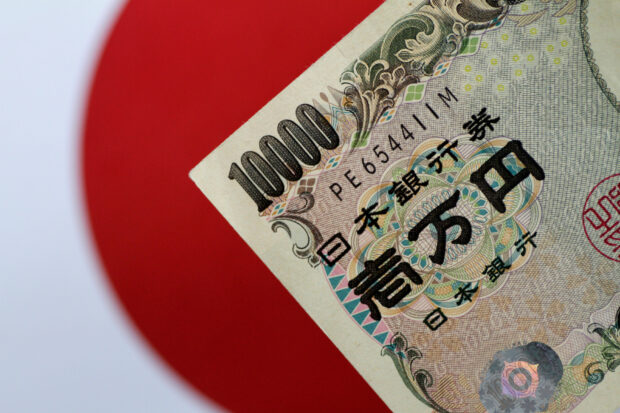Yen slides after minor BOJ policy tweak, stocks gain

A Japan Yen note is seen in this illustration photo taken June 1, 2017. REUTERS/Thomas White/Illustration/File Photo
NEW YORK – The yen slid across the board and hit a 15-year low against the euro on Tuesday after the Bank of Japan’s move to loosen monetary policy was seen as inadequate, while global stock indexes rose a day before the Federal Reserve meets to decide on interest rates.
The BOJ eased its grip on long-term rates by further loosening its bond yield control policy (YCC) on what analysts viewed as a small and insufficient step.
Traders focused on the BOJ’s dovish pledge to “patiently” maintain accommodative policy, and forecast inflation to slow below 2 percent in 2025.
READ: BOJ relaxes grip on rates as end to yield control looms
The yen fell to a new one-year trough against the dollar. The dollar was last up 1.7 percent at 151.56 yen.
The euro jumped against the Japanese currency to a 15-year high of 160.84 yen, and was last up 1.3 percent at 160.20 yen.
“Currency traders unquestionably have their knives out for the yen after last night’s dangerously-ambiguous policy change from the Bank of Japan,” said Karl Schamotta, chief market strategist at Corpay in Toronto.
“With major unknowns remaining around the central bank’s reaction function, and another raft of stronger-than-expected data helping boost U.S. yields, rate differentials are tilting more aggressively against the yen as the session unfolds.”
Investors are waiting to see what the Fed says after a two-day policy meeting ends on Wednesday. They were weighing the likelihood that the U.S. central bank will hold rates higher for longer.
On Wall Street, investors also digested a mixed batch of earnings reports. Heavy-machinery maker Caterpillar fell as dealer inventories rose and a large order backlog shrank, indicating demand is slowing.
Pfizer’s shares were flat after the drugmaker reported its first quarterly loss since 2019.
The Dow Jones Industrial Average rose 123.91 points, or 0.38 percent, to 33,052.87, the S&P 500 gained 26.98 points, or 0.65 percent, to 4,193.8 and the Nasdaq Composite added 61.76 points, or 0.48 percent, to 12,851.24.
All three major U.S. indexes declined for the month and the S&P 500 registered its third straight monthly loss in its longest losing streak since March 2020.
Treasury yields
The pan-European STOXX 600 index rose 0.59 percent and MSCI’s gauge of stocks across the globe gained 0.30 percent.
Longer-dated Treasury yields dipped as investors awaited the Fed statement and comments from Fed Chair Jerome Powell.
Benchmark 10-year note yields were last at 4.875 percent. They are holding below 5.021 percent reached on Oct. 23, the highest since 2007.
READ: 10-year Treasury yield hits 5%, stocks at seven-month lows
Ten-year notes last week hit 16-year highs as investors contemplated higher yields for longer, and on concerns about increasing U.S. Treasury supply.
Traders were relieved after the Treasury Department said on Monday it expects to borrow $76 billion less than previously expected in the fourth quarter.
The Treasury on Wednesday will give details on its debt funding strategy and is expected to increase auction sizes for bills, notes and bonds.
Euro zone yields fell as individual country inflation data pointed to a lower print for the currency bloc overall later in the day. Germany’s benchmark 10-year yield fell 5.5 basis points to 2.77 percent, testing the previous day’s two-week low.
Oil prices eased as investors worried less about potential Middle East supply disruptions, and data showed rising OPEC and U.S. output.
Brent crude futures for December delivery, settled 4 cents lower at $87.41 a barrel, ahead of their expiry later on Tuesday. The more heavily traded January contract fell $1.33, or 1.4 percent to $85.02.
U.S. crude for December delivery fell $1.29, or 1.6 percent to $81.02, while those for January delivery fell $1.18 to $80.50.